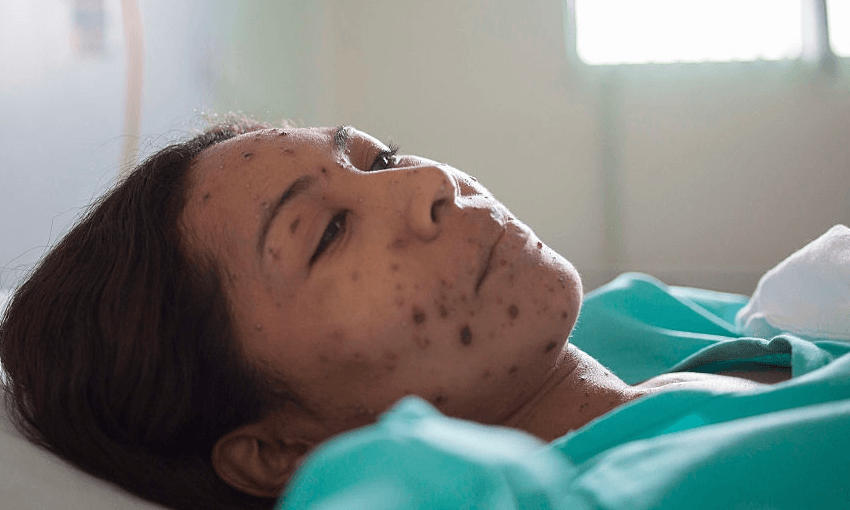More and more cases of the scary spotty disease measles are popping up in the news. Here’s what you need to know about whether you’re in danger.
Getting a serious dose of measles isn’t a pleasant experience. The symptoms are extremely not fun. Ear infections. Pneumonia. The wild shits. Your brain literally swelling so much it hurts to think. Back pain and neck stiffness if it starts to get worse. And then, if it gets really bad, a mild case of death.
There have been a few measles stories around New Zealand this week that are pretty alarming. There have now been five reported cases, including an outbreak in Canterbury. One infected person is in Auckland, the other four are around Rangiora. Public health officials are warning that up to 150 people could have come into contact with the person in Auckland, which means a serious outbreak is possible.
That person was at the Clendon Medical Centre between the 19th and 21st of February. They were also at Middlemore Hospital on the 21st. Public health officials are currently contacting everyone who was there on those dates, telling them to keep a sharp eye out for symptoms.
Of course, there is a large chunk of the population who will be almost certain to avoid catching measles. Anyone who has had two doses of the measles, mumps, rubella (MMR) vaccine would struggle to catch the disease even if they tried – it’s estimated to be 97% effective. The recommended times to get it are at 15 months and 4 years old – then you’re pretty much set for life. If you have only had one dose, the second is free and you can get it at any time – just contact your doctor to find out how.
It’s hard to over-estimate just how important this vaccine has been for stopping measles deaths. Put it like this: In 1980 there were an estimated 257,000 cases of measles a year across the American continent. After population wide vaccination programmes, that was down to 66 a year by 2005. It’s not an exaggeration to say that public health vaccination programmes are one of the proudest achievements in the history of humanity.
Not everyone agrees with that, of course. I’m not going to go into the various arguments against vaccination, because according to an overwhelming scientific consensus and a massive base of research they’re wrong. But people who refuse to get vaccinated put the lives of those who can’t get vaccinated at risk.
This is not buying into an anti-vax argument either – for some the vaccines themselves actually are dangerous. There are those with severe allergies to components in the vaccine, which means it could kill or severely harm them. For others, getting a vaccination at a certain time can be a bad idea – for example, if they’re pregnant, or have an illness or disease which has lowered their immune system. We can’t blame these people for their predicament, but we can protect them.
How? Herd immunity. Basically, the way it works is that if enough people in a population are immune, then the disease can’t gain a foothold. Imagine it like measles is playing a game of The Floor is Lava, in a room with no furniture. For those who can safely get vaccinated, do it knowing you’ll be protecting your fellow humans – particularly toddlers who are too young to get their full dose of vaccination. Hell, I’m not a big fan of needles either, but I am a big fan of not needlessly causing my friends and neighbours to die.
Finally, if you do think you might be getting measles, or have been in contact with someone who has it, and haven’t been fully vaccinated, be very careful. Don’t go to a hospital or a doctor where you might spread it further, call your GP instead and get their advice and expertise.
It may well be that you have to quarantine yourself for a while. After first contact with an infected person, you should be isolation yourself for at least a week, between the 7 and 14 day mark. That’s when you’re most likely to be contagious. Don’t go to the supermarket. Don’t go to work. Definitely don’t go to pick up your kid from their early childhood centre.
Just stay home! Binge watch some TV shows. Catch up on the stack of books sitting by the bed that you’ve always meant to get around to. Read every single article that goes up on The Spinoff – whatever really. Just don’t let yourself contribute to a measles outbreak becoming an epidemic.
